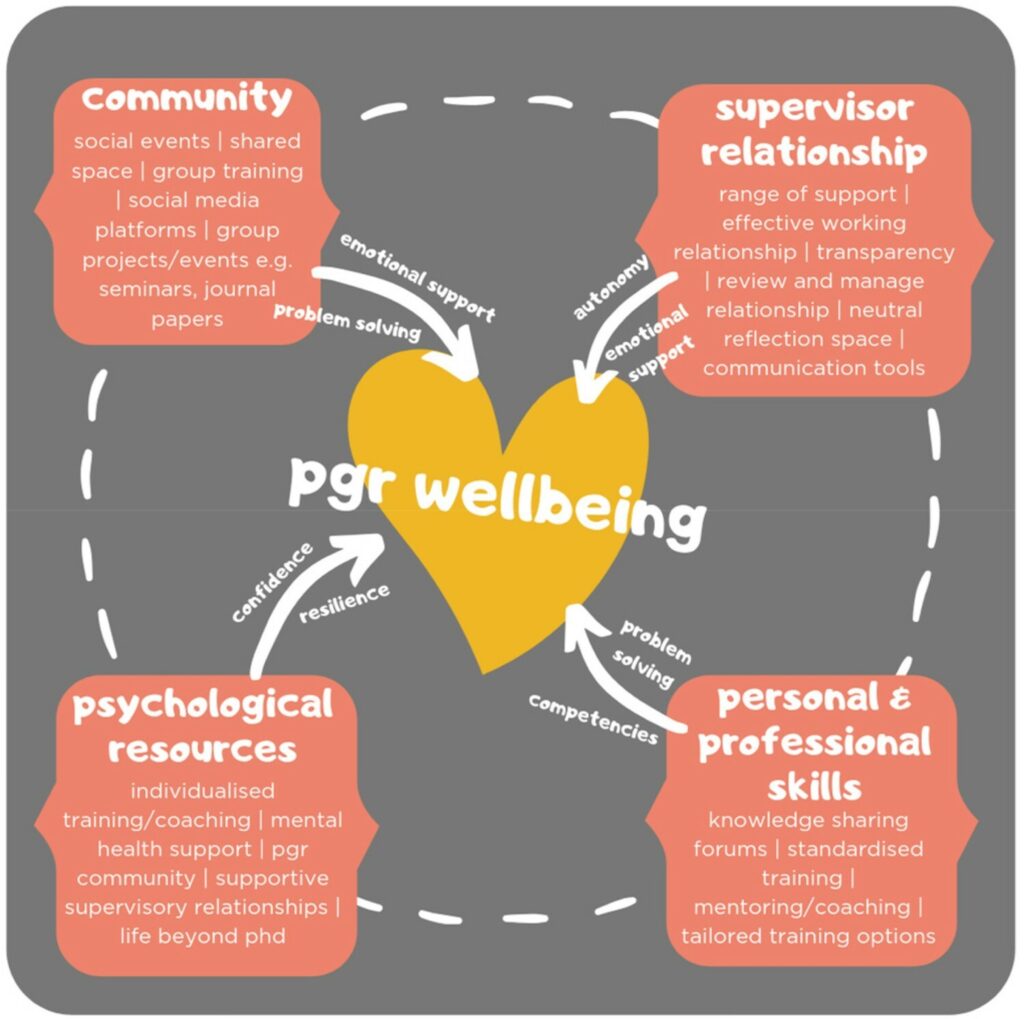Staying mentally and physically healthy is important to ensure you get the most out of your PhD experience and take advantage of opportunities offered to you.
Mental health is something we all have, and which fluctuates naturally. The World Health Organisation defines mental health as ‘a state of wellbeing in which every individual realizes their own potential, can cope with the normal stresses of life, can work productively and fruitfully, and is able to make a contribution to their community’. Good mental health is achieving this state most of the time, and self-care is an important aspect of maintaining good mental health. Some tips for improving your mental health include:
- Spend time in nature
- Connect with others
- Look after your physical health
- Try to get enough sleep
As well as this, your wellbeing as PGRs can benefit from specific practices as highlighted in the infographic below.

Further resources can be found below.
It is also important to have a work-life balance that works for you. For some people, this may be a typical 9-5 workday, whereas for others they may work better in the morning, or in the evening. Some with disabilities may find it more difficult to work a traditional work day, and those with caring responsibilities may have their work day dictated to them around these responsibilities. There should be open, clear communication between you and your supervisors to ensure that you are on the same page when it comes to your work day and that expectations are met on both sides.
Please note that, as a PGR, you are entitled to annual leave too. Total entitlement will be different at each partner institution, but the UKRI Terms & Conditions states “reasonable paid holidays, a minimum of 30 days to a maximum of eight weeks per year to include public holidays is recommended and should be allowed for by Supervisors (pro rata for part time students)”.
If you are finding things difficult, please ask for help. Whilst sensitive to issues that may arise during a studentship, SUPER does not have the necessary expertise or resources to provide dedicated health and wellbeing support. The first point of contact if you are concerned about your health and wellbeing is your host institution, who have dedicated resources and professional services.* Use the links below to access these and find further information for each of the SUPER DTP partner institutions:
- Edinburgh Napier University
- Heriot-Watt University
- University of Aberdeen
- University of the Highlands and Islands
- University of St Andrews
- University of Stirling
- University of Strathclyde
- University of the West of Scotland
*If you or someone you know needs help for a mental health crisis you should get immediate expert advice and assessment. A crisis could include attempted suicide, serious self-harm or harm to others, or situations where you feel you lack a sense of self-control, personal responsibility, or safety. In an emergency, call 999.
To support normalising mental health and wellbeing, and because peer support is an important source of good mental health, funds provided by NERC have allowed SUPER to support 37 individuals to undertake the qualification of First Aid for Mental Health at SCQF level 5. The role of a First Aider is to listen, reassure, support self-help and signpost to the relevant professional services if needed. PGRs and staff are available to speak to across our partner institutions. If you would like to contact a First Aider, please see our contact list.
Resources
- Interventions, practices and institutional arrangements for supporting PGR mental health and wellbeing: reviewing effectiveness and addressing barriers (Watson & Turnpenny 2022).
- Mind, a mental health charity with helpful resources.
- The Scottish Association for Mental Health, a charity which has a wellbeing assessment tool and helpful resources
- Managing your mental health during your PhD, a book by Zoe Ayres.
- Student Space, information and advice from Student Minds, the UK’s student mental health charity.
- Taking care of yourself at university, resources from the Blurt Foundation, a company increasing awareness and understanding of depression.
- Top 10 mental health podcasts, recommended listening from the Blurt Foundation.
- The Knowledge Retreat, a free email programme created for the academic research community to improve focus and inspire.
- Crisis care resources from the Mental Health Foundation.
- Campaign Against Living Miserably (CALM)’s worried about someone webpage.
- Everything you need to know to not just survive but thrive during your part-time doctorate.
- Balancing your PhD and your personal life.
- Supporting adult learners’ positive mental health, a free online training course by the Open University.
- Making sense of mental health problems, a free online training course by the Open University.
Please don’t forget that your host institution will have dedicated mental health services and professionals to support you.
If you find a helpful resource and would like to share with the community, please get in contact via superdtp@st-andrews.ac.uk.
